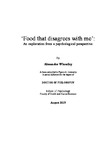‘Food that disagrees with me’: An exploration from a psychological perspective.
| dc.contributor.supervisor | Hyland, Michael | |
| dc.contributor.author | Wheatley, Alexander | |
| dc.contributor.other | School of Psychology | en_US |
| dc.date.accessioned | 2016-05-05T14:39:55Z | |
| dc.date.available | 2016-05-05T14:39:55Z | |
| dc.date.issued | 2016 | |
| dc.identifier | 10013483 | en_US |
| dc.identifier.uri | http://hdl.handle.net/10026.1/4580 | |
| dc.description.abstract |
Food intolerance is a growing concern in the UK given its frequency and cultural popularity. Current medical understanding is at odds with the use of this term by laypeople and in addition health professionals use the term in several ways. The present thesis focused on two main questions: 1. What are people like who report food intolerance? Study 1 showed that food intolerance is a condition that varies, its development, symptoms and the way people interact with and treat the condition is very individualistic. Study 2, showed that inflammatory symptoms were more frequent in the food intolerant population compared to non-inflammatory symptoms. It was also found that participants who reported being high in neuroticism and high in hypochondriasis were 20% more likely of having self reported food intolerance in the population sample. Study 3, replicated the findings found in study 2 in terms of inflammatory and gastrointestinal symptoms and greater anxiety and depression. In addition this study showed that the number of foods that disagree with you was also significantly associated with the number of GP visits in the past 12 months, major illness/chronic health, greater stressors as well as having poorer quality of life. 2. Is it possible to demonstrate that food disagreement is associated with stress? Study 4 showed that people were less stressed before eating foods that disagreed with them. Finally results from study 5 were inconclusive due to methodological problems. The current thesis used a multi method approach to explore the topic. It contributes to a better understanding about food intolerance and introduces new and previously unexplored dimensions about the condition. Most importantly the findings from this thesis provides the next steps for future research about a psychoneuroimmunological basis for food intolerance. | en_US |
| dc.language.iso | en | en_US |
| dc.publisher | Plymouth University | en_US |
| dc.title | ‘Food that disagrees with me’: An exploration from a psychological perspective. | en_US |
| dc.type | Thesis | |
| plymouth.version | Full version | en_US |
| dc.identifier.doi | http://dx.doi.org/10.24382/4658 | |
| dc.identifier.doi | http://dx.doi.org/10.24382/4658 |
Files in this item
This item appears in the following Collection(s)
-
01 Research Theses Main Collection
Research Theses Main


